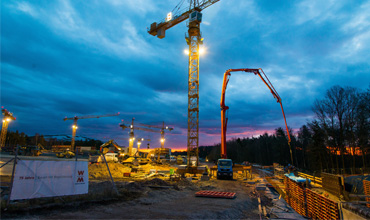
Concrete scaling is the local flaking or peeling off the near-surface concrete caused by environmental variables such as freezing and thawing. The use of low-strength ready mix concrete, deicing salts, and a high water-to-cement ratio in a concrete mixture are three additional elements that may lead to the onset of concrete scaling.
If it is not repaired promptly, the process of scaling concrete will begin in small spots, but it will eventually spread to larger patches and wider areas if the damage is not addressed. Scaling in ready mix concrete can be addressed by cleaning the sections that have degraded and resurfacing the concrete.
What causes the concrete to scale, and how does it happen?
In essence, the presence of water in concrete for construction causes the formation of an expansive pressure as a consequence of the repeated freezing and thawing cycles that occur, which ultimately results in the separation of the concrete close to the surface. Chemical deicers worsen the problem of expansive water pressure by increasing the concrete saturation and the number of freezing and thawing cycles that occur.
The depth of the patches can range anywhere from 2.5 to 10 millimeters in severity when the condition is moderate. In severe circumstances, this, however, can result in aggregate exposure and the bursting out of aggregates.
• Concrete is prone to suffering from scaling.
• The scaling of concrete can be attributed to several factors.
• The practice of subjecting concrete to freezing and thawing cycles before the concrete has attained the necessary level of strength
• Using low-strength concrete or a high water-to-cement ratio makes it easier for water and deicing solutions to penetrate deeper into the surface.
• When hardened concrete is made with materials that do not have air entrained in them or with insufficient amounts of air entrained, the result is an inadequate air void system.
• Improper curing regime.
• If concrete is allowed to cure for a shorter amount of time than is required, the permeability of the concrete will increase, while its strength and durability will also suffer.
• Inadequate protection is being provided to the newly placed concrete after it has been placed.
• Inadequate finishing can cause water to become trapped in the surface of the concrete, which will ultimately result in a reduction in the concrete's strength.
• A concrete surface that dries too quickly will not be able to reach the level of strength that has been specified. As a direct consequence, there is an increased potential for scaling.
• When new concrete is treated with deicing agents, the risk of scaling is significantly increased.
Effects of Scaling
• A weakening of the concrete's structure
• Compromised concrete durability
• If it is not fixed promptly, the concrete has spalled.
• A ready mix concrete surface that has a distorted appearance
• Costs associated with increased maintenance
How can you prevent the scaling of concrete?
1. Appropriately formulate the concrete mix.
2. Use a minimal non-air entrained agent
3. Perform ending operation appropriately
4. Do not add water to the concrete surface during finishing works
5. Prevent the freezing and thawing of newly laid concrete by taking the appropriate precautions.
6. Avoid concrete exposure to corrosive chemicals such as salts
For more details connect with West London Concrete!